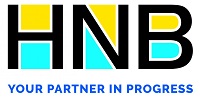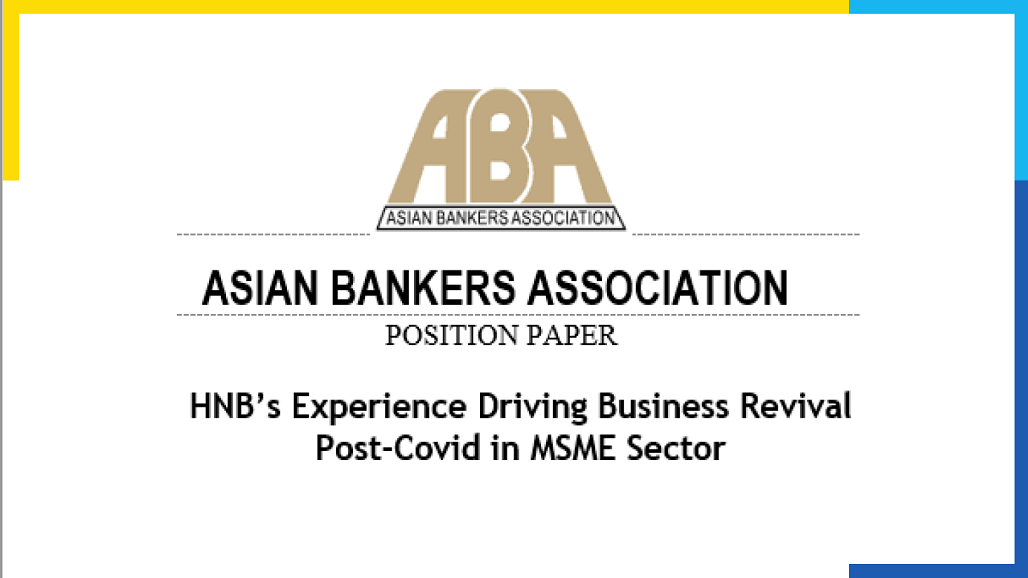HNB’s Experience Driving Business Revival Post-Covid in MSME Sector
(1) Background
 Two cataclysmic events – 21st April 2019 Easter Sunday Bombings and Covid19 Impacts in early part of 2020, made significant impacts to business in general and in particular the Microfinance and SME Sector (hereafter referred to as MSMEs) which contributes over 50% of GDP and Employment Opportunities to Sri Lanka. Hatton National Bank (HNB) is the leading private sector bank engaged in this sector.
Two cataclysmic events – 21st April 2019 Easter Sunday Bombings and Covid19 Impacts in early part of 2020, made significant impacts to business in general and in particular the Microfinance and SME Sector (hereafter referred to as MSMEs) which contributes over 50% of GDP and Employment Opportunities to Sri Lanka. Hatton National Bank (HNB) is the leading private sector bank engaged in this sector.
The impacts on business from these two events were significant, given impacts to tourism, construction, trading among other industries. Consequently, the government initiated a Covid-19 relief program that comprised moratoriums on debt and working capital financing to support business revival efforts.
This paper outlines the strategy and measures taken by the HNB to support MSMEs during this period.
(2) Visioning
Immediately after the Easter attack, the HNB realized the importance of engaging with clients closely to help ease the frustration and stress associated with their business being disrupted like never before. Its role was to support businesses to get back on track using innovative new strategies and facilitate learning from best practices and each other and most importantly to effectively adapt to change.
HNB commenced regional workshops with its key customers with the support of external consultants who brought in necessary expertise to discuss how business goals and strategies need to change to adapt to the new business environment. Case studies of successful change journeys were shared, key priorities and focus areas were identified, giving business owners the confidence to embrace new vistas. HNB Relationship Managers played an active role engaging with impacted clients mainly in the tourism sector to create dialogue and providing necessary confidence to face the new market through various new avenues such as promoting local tourism, redeployment of hotel space for productive use such as functions, meetings, catering, event management and even for educational purposes.
The Bank continued its commitment to enhance financial literacy and also technical knowledge of the MSME’s and during the pandemic organized a series of webinars educating customers how to restart the businesses and also explaining the support they can receive from the Bank.
(3) Role redefinition of MSME Relationship Managers
With the Easter attack, The Bank was contemplating the necessity to establish seasoned relationship managers to handle the stressed accounts and it established the SAM (Special Account Management) concept which supported our efforts post Covid pandemic and remains to date. HNB appointed dedicated SAM Relationship Managers for the identified Stressed customers, with the goal of nurturing them back to recovery. This team was effectively trained with problem solving skills, mentoring and proficiency in the Bank’s own digital products and was able to ably support customers with identifying new markets, making supply chain linkages and necessary financing to support business revival efforts.
(4) Strengthening supply chain linkages Post Covid
MSME clientele faced major challenges post pandemic due to disruption of their traditional supply chains and HNB actively supported customers to develop new supply chain linkages during this period from its own extensive customer base comprising over 100,000 businesses engaged in microfinance, SME, emerging corporates and large corporates.
During phase one, the Bank was able to link fair number of farmers direct to super market chains and wholesalers in the absence of the regular intermediary buyers. Although it was challenging during this period with its extensive branch network and its field officer concept, the Bank was able to collect details and share same with its corporate clients who run super markets, exporters and major suppliers to government institutions, etc.
This initiation prompted HNB to look at a permanent solution for this and the Bank is in the process of establishing a concept called Market Place for its own Micro, SME and Corporate sectors to buy and sell on an electronic platform where the Bank links its clients involved in transport, logistics and Insurance businesses to take part as service providers.
HNB’s involvement into supply chain financing working with large corporates and also financing thousands of farmers who supply to these corporates for their production became even a bigger success during pandemic due to the Bank’s commitment and passion in supporting this micro and low-end SME’s to grow their crops even during the pandemic with the Bank’s financial support. During pandemic HNB able to support over 10,000 farmer families with this approach. This is a significant community initiative as without this support many of them would have had to destroy their crops or be exploited by unethical merchants.
Due to import restrictions, most corporates in the manufacturing sector opted for local inputs instead of importing (e.g., inputs for poultry feed, grains for cereals, etc.). They consequently looked for partnerships/backward integrations to fill the gap with the encouragement of the Bank.
Lending to the agriculture sector continued during the pandemic with the support of HNB’s widespread Micro finance field officers and Agricultural executives whose field visits were continued uninterruptedly with social protocols, thus supporting the farming community.
There were a lot of cottage industries funded under the Bank’s Gami Pubuduwa Micro finance scheme that also suffered setbacks due to loss of market and immobility during the pandemic. As a noble cause, HNB was able to launch a Micro finance grant programme for selected clients who genuinely suffered during the pandemic and needed working capital to revive their businesses. The Bank was able to support 200 small entrepreneurs with grants to revive their businesses without increasing their financial commitments at this juncture.
(5) Driving Digital onboarding and products
Onboarding the SME sector to digital platforms has always been a challenge; however, the pandemic served to expedite these efforts significantly. During the pandemic, HNB supported a lot of small businesses to obtain online cash collecting methods such as usage of MOMO’s ( Mobile POS), SOLO (Digital Wallet), IPG (Internet Payment Gateway) etc. which really supported the client base to shift from their traditional brick and mortar business.
HNB’s latest app for online sales Appigo (make your own online store) assisted small timers to commence online retailing at a very lower cost without the cost and hassle of creating a website for their business. The Bank engaged with a business partner to support this infrastructure to manage day-to-day business activities in digital platforms with requisite stock control and payments systems which has always been a challenge in this sector.
The development of a Digital Market Place concept was a key initiative to digitally connect HNB’s clients as suppliers, buyers and service providers.
(6) Learning and Challenges
MSME’s are a vital sector for the country and HNB’sability to protect and nurture its customers during the pandemic, in keeping with its tagline ‘partner in progress’ helped the Bank to strengthen the bond between the Bank and the client. However, necessary investments made on the technology front to support working from home, engaging digitally with clients, the range of digital products and the changes made to the operating structure in the last five years held HNB in good stead to support its efforts in this area.
HNB’s own frontline marketing and relationship management staff were forced to adapt to a more mentor-and-guide role, and capacity building backed by a discipline of measuring progress on key dimensions such as Business Recovery, Asset Quality etc., supported its efforts.
One of the key learnings was the pace in which the Bank, customers and employees embraced technology to achieve competitive advantage and growth.
The presentation file can be downloaded HERE.
The video recording of ABA Policy Advocacy Committee Meeting can be viewed in the ABA YouTube.
Prepared for the Asian Bankers Association by:
 Mr. Dilshan Rodrigo
Mr. Dilshan Rodrigo
Chief Operating Officer
Hatton National Bank

